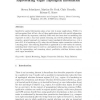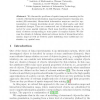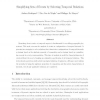60 search results - page 8 / 12 » Rule-based reasoning about qualitative spatiotemporal relati... |
JANCL
2007
13 years 7 months ago
2007
Qualitative coalitional games (QCGs) were introduced as abstract formal models of goal-oriented cooperative systems. A QCG is a game in which each agent is assumed to have some goa...
IJAR
2008
13 years 7 months ago
2008
Qualitative spatial information plays a key role in many applications. While it is well-recognized that all but a few of these applications deal with spatial information that is a...
RSFDGRC
2005
Springer
14 years 29 days ago
2005
Springer
We discuss the problems of spatio-temporal reasoning in the context of hierarchical information maps and approximate reasoning networks (AR networks). Hierarchical information maps...
MICAI
2005
Springer
14 years 1 months ago
2005
Springer
A powerful and useful approach for modeling knowledge and qualitative reasoning is the Cognitive Map. The background of Cognitive Maps is the research about learning environments c...
GISCIENCE
2004
Springer
14 years 26 days ago
2004
Springer
Reasoning about events or temporal aspects is fundamental for modeling geographic phenomena. This work concerns the analysis of events as configurations of temporal intervals. It...



